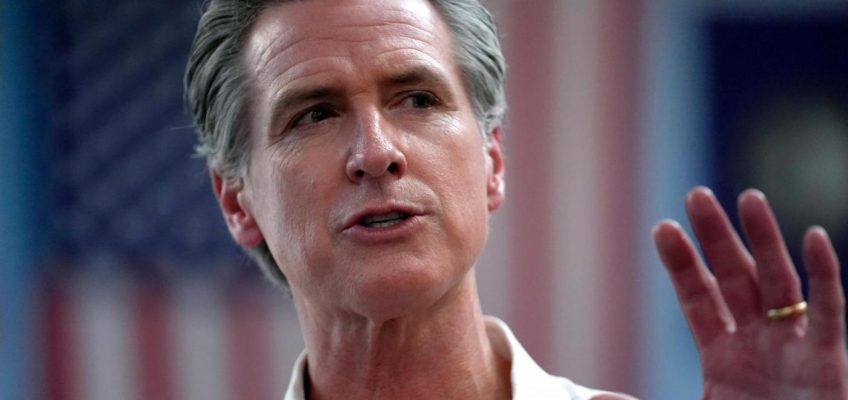By JOHN LEICESTER, Associated Press
PARIS (AP) — Paris has long been a city of dreamers: Just look at the Eiffel Tower, for decades the world’s loftiest structure. Audacity also underpins the French capital’s plans for its first Olympic Games in a century, which open Friday with an opening ceremony for the ages.
The most sprawling and elaborate Olympic opening ever — a gala spectacular Friday evening on the River Seine that even French President Emmanuel Macron says initially felt like “a crazy and not very serious idea” — kicks off 16 days of competition that promise to be ground-breaking, with nearly every corner of the city hosting some aspect of competition.
Children play at a splash fountain area near signage for the 2024 Summer Olympics, Tuesday, July 23, 2024, in Nice, France. Nice will host six soccer matches during the summer games. (AP Photo/Julio Cortez)
After two toned-down, pandemic-hampered Olympics, expect a bold celebration. The heady marriage of sports and France’s world-renowned capital of fashion, gastronomy and culture could also help secure the Olympics’ longer-term future.
Olympic organizers were struggling to find suitable host cities for their flagship Summer Games when they settled on Paris in 2017, enticed by its promise of innovations and the potential for the city of romance to rekindle love for the Olympics, especially with younger audiences that have so many other entertainment options.
But Paris’ challenges are huge, too.
Past and present sorrows hang over the Games
The city that has been repeatedly struck by deadly extremist attacks has to safeguard 10,500 athletes and millions of visitors. The international context of wars in Ukraine and Gaza add layers of complication for the gargantuan security effort. French elite special forces are part of the security detail for Israel’s delegation.
Still, if all goes well, Paris hopes to be remembered as a before-and-after Olympic watershed.
FILE – Police check the public for credentials to enter a security perimeter near the Eiffel Tower ahead of the 2024 Summer Olympics, Saturday, July 20, 2024, in Paris. Three days before the start of the Olympics, France’s Interior Minister has hailed the country’s law enforcement for their hard work in making the Paris Games safe for 10,500 athletes and millions of visitors. (AP Photo/David Goldman, File)
The first Games with nearly equal numbers of men and women, an advance that’s been a long time coming since 22 women first got accepted as Olympians 124 years ago, also in Paris, will take another step toward aligning the Olympics with the post-#MeToo world.
Paris also hopes to reassure climate-conscious Generations Z and beyond by staging Games that are less polluting, more sustainable and more socially virtuous than their predecessors. Many of the sports venues are temporary, because Paris didn’t want to repeat the mistake of previous Olympic host cities that built new arenas and then had no use for them.
With iconic Paris monuments as backdrops — beach volleyball in the Eiffel Tower’s shadow — and breakdancing added to a growing list of Olympic sports that target young audiences, expect plenty of viral moments on Instagram, TikTok and elsewhere.
Athletes play at the Tour Eiffel stadium that will host the Beach Volleyball on the Champs-de-Mars, at the 2024 Summer Olympics in Paris, France, Wednesday July 24 2024. (Christophe Petit Tesson, Pool via AP)
Crowds will be back for the first time since the coronavirus pandemic forced Tokyo to push back its Games to 2021 and keep spectators away, and the Beijing Winter Games in 2022, when China was locked down.
Prize-winning French theater director Thomas Jolly is turning central Paris into an open-air stage for the opening ceremony that will run through sunset and showcase France, its people and their history. The 330-meter-tall (1,083-foot-tall) Eiffel Tower will surely feature prominently.
Bangladeshi tourist Rushnia Nur Rayfa stands in front of the Eiffel Tower ahead of the 2024 Summer Olympics, Monday, July 22, 2024, in Paris, France. (AP Photo/Natacha Pisarenko)
Hundreds of thousands of people, including 320,000 paying and invited ticket-holders, are expected to line the Seine’s banks as athletes are paraded along the river on boats.
During the extravaganza, a no-fly zone extending for 150 kilometers (93 miles) around the capital will close Paris’ skies, policed by fighter jets, airspace-monitoring AWACS surveillance flights, surveillance drones, helicopters that can carry sharpshooters and drone-disabling equipment.
Helping Parisians move past the attacks of 2015
Showcasing and celebrating Paris could be joyously cathartic for the city that was plunged into mourning by extremist attacks in 2015.
Guesses about the identity of the person or people who might get the honor of lighting the Olympic cauldron include soccer icon Zinedine Zidane and other French sporting heroes, but also survivors of Islamic State-group gunmen and suicide bombers who killed 130 people on Nov. 13, 2015.
A couple stand next to a security fence placed around Notre Dame cathedral ahead of the 2024 Summer Olympics, Monday, July 22, 2024, in Paris. (AP Photo/Francisco Seco)
Paris is also taking gambles in hopes of leaving an indelible impression on the Olympics’ global audience of billions.
The decision not to stage the opening ceremony in the traditional setting of France’s biggest stadium — the Stade de France that was among the 2015 attackers’ targets and is now the venue for Olympic track and field and rugby sevens — and to host skateboarding, archery and other sports in temporary arenas in the heart of Paris have made safeguarding the Games more complex.
Officers from the National Police Intervention Force stand watch outside Sacre Coeur of Montmartre Basilica, ahead of the 2024 Summer Olympics, Monday, July 22, 2024, in Paris, France. (AP Photo/Rebecca Blackwell)
Rights campaigners and Games critics worry about the broad scope and scale of Olympic security, including the use of AI-equipped surveillance technology.
Paris’ reach stretches to the Pacific
The furthest venue is on the other side of the world in the French Pacific territory of Tahiti, where Olympic surfers will compete on famously giant waves that first form in storm belts off Antarctica.
Up to 45,000 police and gendarmes, plus 10,000 soldiers, are safeguarding Paris and its suburbs that together are hosting most of the 32 sports that will crown Olympic champions in 329 medal events. The gold, silver and bronze medals they’ll hand out are inlaid with a hexagonal, polished chunk of iron taken from the Eiffel Tower.
A worker drives a golf cart inside the competition venue for BMX freestyle ahead of the 2024 Summer Olympics, Friday, July 19, 2024, in Paris. (AP Photo/David Goldman)
The Seine’s banks and riverside roads and more than a dozen of its bridges were fenced off nine days ahead of the opening ceremony, creating a no-go zone for people who haven’t applied in advance for passes and making it tough for Parisians and visitors to get around and see the sights in the city of 2 million. Owners of restaurants and other businesses inside the security fence are howling about fewer customers.
Paris Olympics: Here’s what’s on TV on Thursday
Winter Olympians will compete at these 13 venues when the Games return to Salt Lake City in 2034
Eiffel Tower stadium wows Olympic beach volleyball players: ‘I got goosebumps’
PHOTOS: Getting started at the Paris Olympics
Rise of women’s sports brings greater emphasis on maternity and parental needs
Leaving an Olympic legacy for Paris
Limiting new construction has saved money and, Paris organizers say, contributed to their goal of halving the Games’ overall carbon footprint compared with London in 2012 and Rio in 2016. Among the new venues, an Olympic aquatics center in Seine Saint-Denis is expected to help that underprivileged suburb of northern Paris teach more children to swim.
French organizers argue that the Games will leave positive impacts on Paris long after the Olympians and Paralympic athletes who follow from Aug. 28 to Sept. 8 have departed.
A costly and complex cleanup of the long-polluted Seine, sped up by the deadline of the Games, is expected to reopen the river to public swimming next year, after Olympic marathon swimmers and triathletes have competed in it. Paris Mayor Anne Hidalgo took a dip this month to demonstrate that its waters are safe.
With estimated overall costs of around 9 billion euros ($9.7 billion), more than half from sponsors, ticket sales and other non-public funding, Paris’ expenses so far are less than for Tokyo, Rio and London.
A cyclist argues with police officers near Le Louvre museum at the security perimeter set up for the Olympic Games, Thursday, July 18, 2024 in Paris. A special kind of iron curtain came down across central Paris on Thursday, with the beginning of an Olympic anti-terrorism perimeter along the banks of the River Seine sealing off a kilometers-long (miles-long) area to Parisians and tourists who hadn’t applied in advance for a pass. (AP Photo/David Goldman)
Once opening ceremony fireworks have become memories, the City of Light will then become the playground of Olympians.
American gymnastics superstar Simon Biles is back. French-born basketball phenom Victor Wembanyama will carry home hopes on his 7-foot-4 (2.24-meter) frame. Ukrainian and Palestinian athletes have points they want to prove about conflict, resilience and sacrifice that go beyond the realms of sport.
The lucky few will win medals. Many will wish they had gone higher, faster and stronger.
But, together, they’ll always have Paris.




